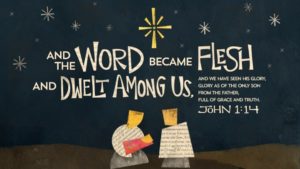John 1:14 (NASB)
And the Word became flesh, and dwelt among us, and we saw His glory, glory as of the only begotten from the Father, full of grace and truth.
This memory verse, John 1:14, is arguably the Bible’s greatest verse about the incarnation. The Word (God the Son) became flesh (human) and took up residence (tabernacled or pitched His tent) among us. We observed His glory and saw that He was the one and only God the Son, full of grace and truth.
Christ became flesh. The Incarnation did take place. The Son of God was made flesh. He came to earth in the person of Jesus Christ. There is no doubt about John’s meaning here.
This representation of the Word (logos) as a personal being in human flesh is a reversal of the concept of the Word as an impersonal principle or force. The emphasis on the “flesh” could be an attempt to correct misunderstandings about the humanity of Jesus present in the early church. One of the earliest Christological heresies from the second century AD was Docetism, which held that Jesus was fully divine and only appeared human and only appeared to die on the cross. The idea that divine beings could appear in human form was common in the ancient world, so John seems to take extra care to emphasize that Jesus was human, not that He merely appeared in human form. The later Christological heresy of Arianism emphasized Jesus’ humanity at the expense of His divinity, claiming He was a created being.
The word “flesh” is the same word that Paul used to describe man’s nature with all its weakness and tendency to sin. This is a stunning thought. Jesus Christ is God—fully God, yet Jesus Christ is man—fully man. The word “saw” means seeing with the human eye. It is used about twenty times in the New Testament. There is no room whatever for saying that God becoming a man was merely a vision of some man’s mind or imagination. John was saying that he and others saw with their own eyes the Word made flesh. Jesus Christ was beyond question God Himself who became man, who partook of the very same flesh as all other men.
God’s glory was seen. Two things are meant by the word “glory.”
- Christ was the Shekinah glory of God. The word Shekinah means that which dwells or dwelling. It refers to the bright cloud that God used to guide Israel out of Egypt and that rested upon the tabernacle and above the mercy seat in the Most Holy Place (Exodus 40:34-38). The cloud symbolized God’s presence, and that is just what John was saying. “We beheld,” saw with our eyes the Shekinah glory, God’s very presence “dwelling among us.”
- Christ was the very embodiment of God, all that God is and does. John said “we beheld,” looked at Him, and could tell He was God. All that Jesus was in His person and being, character and behavior, was so enormously different. In person and behavior, work and ministry.
The glory of all that God was stood right before them, right in their very presence. They beheld Him with their very own eyes. Jesus Christ, the Man who dwelt among them, could be no other than the glory of God among men. It was clearly seen that “in Him dwelt all the fulness of the Godhead bodily”.
A striking fact is that James, who was the Lord’s brother, even called Jesus “the Lord of glory.” Just think: James was reared with Jesus beginning from the earliest years of childhood stretching right on through the years of adulthood. If anyone ever had an opportunity to see and observe Jesus, it was James. He had every chance to see some act of disobedience, some sin, something contrary to the nature of God. However, James’ testimony is: “Our Lord Jesus Christ, the Lord of Glory,” the One in whom the very presence of God dwelt among us (James 2:1).
